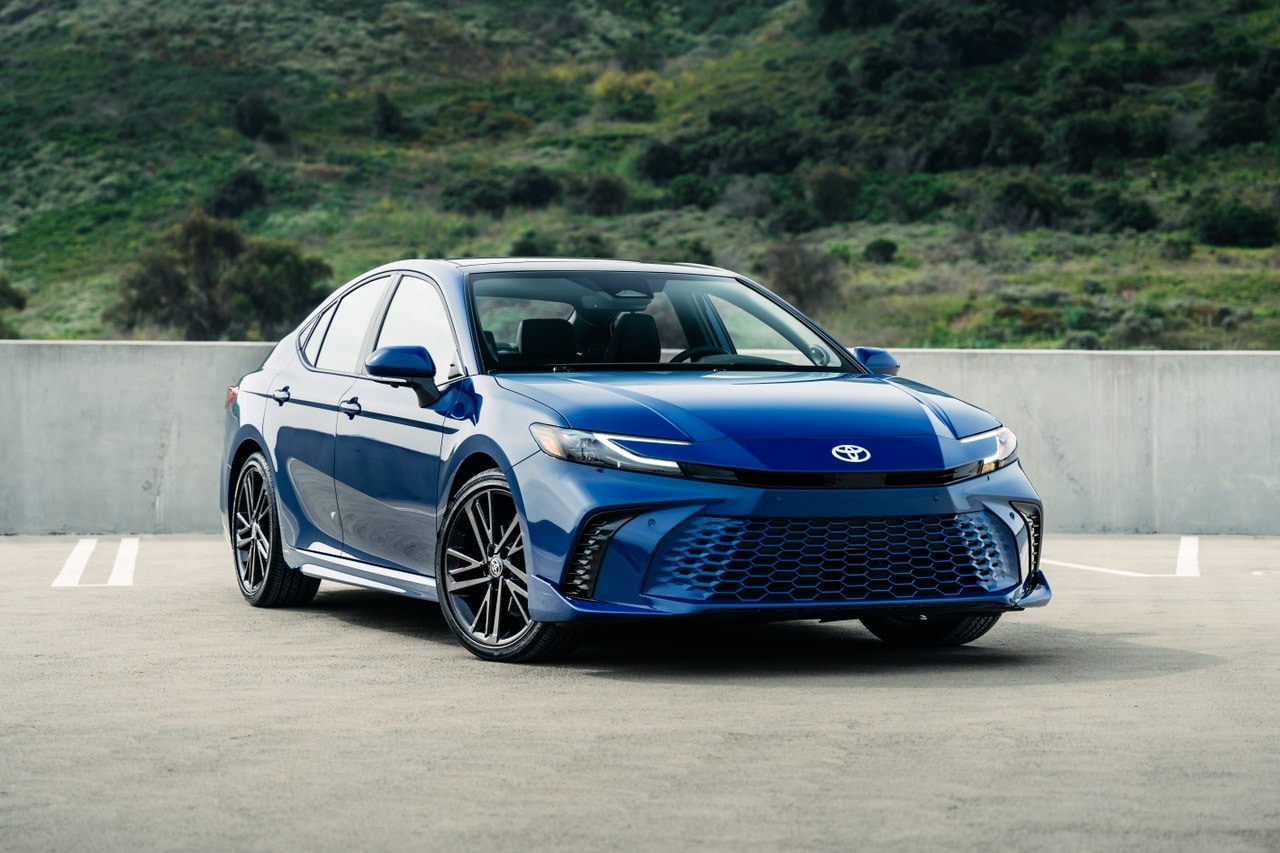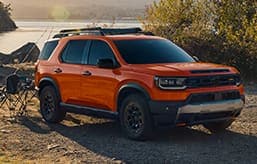- We drove a 2025 Toyota Camry at our test track and on public roads to fully evaluate the redesigned midsize sedan.
- For 2025, the Toyota Camry gets a restyled exterior and cabin.
- This newest generation boldly adopts a hybrid-only strategy.
2025 Toyota Camry: Full Rating Results
Bold hybrid-only strategy pays off
The 2025 Toyota Camry represents one of the most meaningful redesigns the stalwart midsize sedan has ever seen. Though largely based on the previous-generation Camry, the 2025 model has a sharper design, an overhauled interior, more precise handling and, most importantly, is only available as a hybrid. As with all vehicles that pass through the Edmunds office, we subjected the new Camry to our full evaluation process — which includes instrumented performance testing on a closed test track and driving in the real world on a standardized evaluation loop — to determine where it ranks in its class.
The rating below compares the 2025 Camry against its direct rivals in the midsize sedan category, with section scores contributing to the overall score. Section scores are determined by the value of their subsection scores, which evaluate individual aspects of a vehicle. The overall score and section scores are always published on a vehicle page; subsection scores that provide greater detail are presented here publicly for the first time.
This rating was written by Clint Simone and edited by Jonathan Elfalan.
Performance: 8
We tested the Camry XSE with front-wheel drive. Acceleration is smooth and easy during everyday driving, and there's enough power on tap to get you moving when you need it. At the Edmunds test track, our test Camry sprinted from zero to 60 mph in 7.8 seconds, which is slightly quicker than the hybrid versions of the Honda Accord and Hyundai Sonata. The brakes are strong and smooth.
We are also impressed with the Camry's responsive steering and stable handling. Granted, we tested an XSE, which has a sport-tuned suspension, but overall you can expect the Camry to be secure when driving around corners.
Acceleration: 7.5
The Camry sprinted from zero to 60 mph in 7.8 seconds during our testing. That puts it smack in between the hybrid Accord and Sonata Hybrid. It's a tad quicker than the previous-generation Camry Hybrid, too. In the real world, the 232 horsepower on tap is plenty to get the car up and moving.
Braking: 8
The 60-0 mph panic stop result of 118 feet is dead-on with the Honda Accord hybrid. This is a huge improvement over the old Camry's 132-foot stop. The pedal is perfectly dialed in for everyday driving, making the Camry super easy to gauge when to slow down and how hard to press the pedal.
Steering: 8
This might be an unpopular opinion, but I prefer the Camry's steering to the Accord's. There is a huge difference in the steering weighting between Normal and Sport modes, which I appreciate. It makes me feel more engaged as I'm driving. The car turns in with quick and small inputs — the exact behavior that I want from a front-wheel-drive sedan. It could offer more feedback from the road, though.
Handling: 8
The Camry is surprisingly composed and feels connected to the road. Driving the Accord and Camry back-to-back highlights the Accord's slight handling edge, but the two are probably closer than they've ever been. The Toyota exhibits way less body roll and understeer than the Hyundai Sonata. This is easily the best-driving Camry I've ever been in.
Drivability: 8.5
The handover from electric propulsion to combustion engine is smooth as silk. Even with the audio system off, it's sometimes difficult to hear when the engine kicks on. All of the inputs are relaxed and nothing feels too sensitive. Just a dead-easy car to drive, which is exactly what it should be.
Comfort: 8
The Camry's front seats are a bit too firm for our liking. However, they do a great job of supporting your back on long trips and are generally very comfortable once you settle in. The climate control system works well with strong fan speed and a great auto setting.
Toyota dialed in the ride comfort just right on this new Camry. It doesn't feel floaty or disconnected from the road, but it soaks up bumps and dips without issue. The cabin stays nice and quiet, even at highway speeds. The only major noise intrusion comes from the engine, which is gritty and unpleasant to listen to when you mash the gas.
Seating comfort: 7.5
The seats are a bit flat, and the cushioning is a little stiffer than expected. They do offer great back support, however.
Ride comfort: 8
The Camry's ride is impressive, even though our XSE test vehicle has a sport-tuned suspension. Most of the body motion over bumps is all around the front axle, but even that is minimal. This car is not floaty at all but still soaks up bumps nicely. Seems like the 18-inch wheel offers the perfect amount of sidewall for the job.
Climate control: 8.5
During my test loop, I set the automatic climate control to 72 degrees. I never had to touch it once, which is rare when you're behind the wheel that long. Heated seats are some of the better that I've experienced lately, working quickly to get up to temp.
Noise and vibration: 8
The Camry is noticeably quieter than the Sonata on the highway. It does a great job of keeping most outside intrusions from the cabin — my only complaint is the engine noise at higher speeds. It's gritty and not very nice to listen to.
Interior: 8.5
There's an immediate feeling that the Camry's interior took a few steps up with this new generation. Underneath the large touchscreen is a row of easy-to-use physical switches and knobs to control the car's climate system. The steering wheel buttons are a bit confusing at first but make sense with familiarity.
Compared to some other midsize sedans, the Camry's driving position is pretty upright — almost too much. This gives a more high-riding feeling with a great view over the hood and directly behind. Passenger space is solid in both rows, and the car's flat roofline means that headroom is good for everyone.
Ease of use: 8.5
Toyota nails the basics here with easy-to-use buttons and knobs all over the dash. Climate controls are simple and the volume is controlled with a knob (praise be). The only thing keeping this from a perfect score are unintuitively placed steering wheel buttons, which makes it difficult to figure out what does what.
Getting in/out: 8
This is easier to get in and out of, compared to the Honda Accord. The doors open super wide and the seats require less of a slouch to sit down. The driving position is borderline too tall.
Driving position: 8
Surprisingly upright. It feels less car-like and more like a compact SUV, which is probably what most people prefer. The steering wheel and seat both offer a wide range of adjustment. This Camry is lacking a memory function for the driver's seat, which is an oversight.
Technology: 8.5
Most Camry trims come with a large 12.3-inch touchscreen that features wireless connectivity for Apple CarPlay and Android Auto smartphone integration. Overall, device integration is among the best in the class, including a wireless charging pad that works and doesn't overheat your phone. The optional nine-speaker JBL audio system sounds better than other Toyota products of the last few years, but it still lags behind some rivals' Bose alternatives.
The real impressive stuff is with the driver aids. The Camry features the latest in Toyota safety tech and they are nearly flawless. The system can now sense when cars are coming in and out of lanes and can adjust speed accordingly. With the optional Traffic Jam Assist feature, you can also take your hands off the wheel at speeds of up to 25 mph when conditions allow.
Audio and navigation: 8
Toyota has righted the ship in this department, big time. The new Camry has a generously sized screen that uses wireless Apple CarPlay and Android Auto. The native nav system is less sharp than Google Maps, but it has real-time traffic data and good POI info. I still think Toyota's JBL audio systems lag behind their competition, though the latest generation seems to be closing that gap.
Device integration: 8.5
This is about as good as it gets for device integration. Wireless Apple CarPlay and Android Auto are standard, and they work super well. Toyota still provides USB-A and C ports, which might be irrelevant in a few years but for now feels like the right move. The charging pad fit my giant iPhone (including the case) without issue and was actually charging it, not just cooking it.
Voice controls: 8
Toyota's native voice assistant seems to be getting quicker with time. It pulled up directions without issue and didn't take too long doing it. The controls feel one step below the Google Voice Assistant, and the score reflects that.
Driver aids: 9
This is my first time using Safety Sense 3.0 and I am blown away. I've driven probably every iteration of this suite before and this one absolutely bests all of them. The adaptive cruise can now sense when cars enter and exit the lane ahead, so it slows the Camry much more smoothly as a result. Steering assist is just fantastic, and the lane-keep even lets you merge without using the blinker. Traffic Jam Assist lets you take your hands off the wheel at speeds up to 25 mph — it now has better graphics to alert you to what's going on. Bonus points that blind-spot warning is standard kit (it's optional on the Accord).
Storage: 8.5
While the Camry has less cargo space in the trunk compared to the Sonata and Accord by the numbers, its 15.1 cubic feet is enough to handle a few large suitcases or a sizable grocery run. Small-item storage is fantastic. There are a few different locations to store your phone, the door pockets can take on large water bottles, and the bin next to the wireless charging pad works great for keys.
If you need to install car seats for small children, LATCH anchors are located under clearly marked flaps and are close to the surface with nothing getting in the way. The rear bench is also wide and spacious enough that multiple seats should work fine. Just watch your head on the way in.
Cargo space: 8.5
The 15.1 cubic feet of space is less than both the Hyundai Sonata and the Honda Accord. Still, it should be plenty of space to accommodate a few large suitcases or a typical Costco run for the family.
Small-item storage: 8.5
There are nicely sized door pockets to place your phone in, and center console space is decent. The area next to the wireless charging pad is a great spot to throw keys and other small items.
Car seat accommodation: 8
LATCH anchors are located under clearly marked flaps and are close to the surface with nothing getting in the way. The rear bench is wide and spacious enough that multiple seats should work fine. Just watch your head on the way in.
Value: 8
Toyota's decision to make every Camry a hybrid means you have plenty of trim levels to choose from if you want a hybrid. That's a different approach than, say, Honda, which reserves the hybrid version of the Accord for its most expensive trims. Overall, we think there's solid value in what you pay and the features you get. Toyota's warranty is average, though it does include two years/25,000 miles of complimentary maintenance and two years of roadside assistance.
Build quality: 8
I truly believe that this score should be higher; however, the car we tested is a preproduction unit. It has a few obvious problem areas with fit and finish — ones that Toyota will likely iron out in the production models. The driver's door has a loose panel and the rear seat material is already starting to sag a bit.
Cost: 8.5
The new Camry starts at $28,400 before destination, making it the least expensive hybrid option among its peers. Both Honda and Hyundai start their hybrid trim levels at over $31,000.
Fuel economy: 8.5
Toyota says that a Camry can get 44 to 51 mpg in combined city/highway driving, depending on the car's configuration and trim. That makes the Camry one of the most efficient cars you can buy that's not a plug-in hybrid or full electric. On our standardized evaluation route, we observed 45.9 mpg from our front-wheel-drive XSE test car, which is just a bit less than Toyota's 47 mpg estimate but better than what we got from a hybrid Accord.
Warranty: 7.5
Toyota offers a three-year/36,000-mile basic warranty and five-year/60,000-mile powertrain warranty, which is standard for the segment.
Ownership: 8
Toyota provides two years of roadside assistance, and the first two scheduled services (to be completed in the first two years or 25,000 miles) are complimentary.
Wildcard: 7.5
Fun may not be the first thing that comes to mind when driving the Camry, but it's more than competent on a twisty road and there is now finally enough power to make a pass on the highway. From a design perspective, the new Camry is spicier than before. For a car that has never had much personality, Toyota is finally letting the Camry shine a bit.
Fun-to-drive: 7.5
The Camry and its now-standard hybrid powertrain is refined to drive but falls short of fun. It's beyond competent for what it needs to be, albeit with the usual shortcomings that FWD cars offer.
Personality: 7.5
Slowly but surely Toyota is making this thing more exciting. There are some nice colors to choose from and even a red interior option. I wish the Camry had the same wow factor as the new Prius, but it's still heading in the right direction.
Overall Rating: 8.1
The latest Toyota Camry now has an all-hybrid lineup and it makes perfect sense for this moment. Besides its great fuel economy, the Camry has a roomy and comfortable cabin, many helpful technology features, and just enough athleticism and style to make it interesting. It's a great pick for a midsize sedan.
Edmunds says
The 2025 Toyota Camry is a marked improvement over last year's model and is much more competitive in its segment. For the first time in years, it bests the Honda Accord in our rankings, even if it can't unseat the excellent Kia K5 in the top spot.






 by
by  edited by
edited by